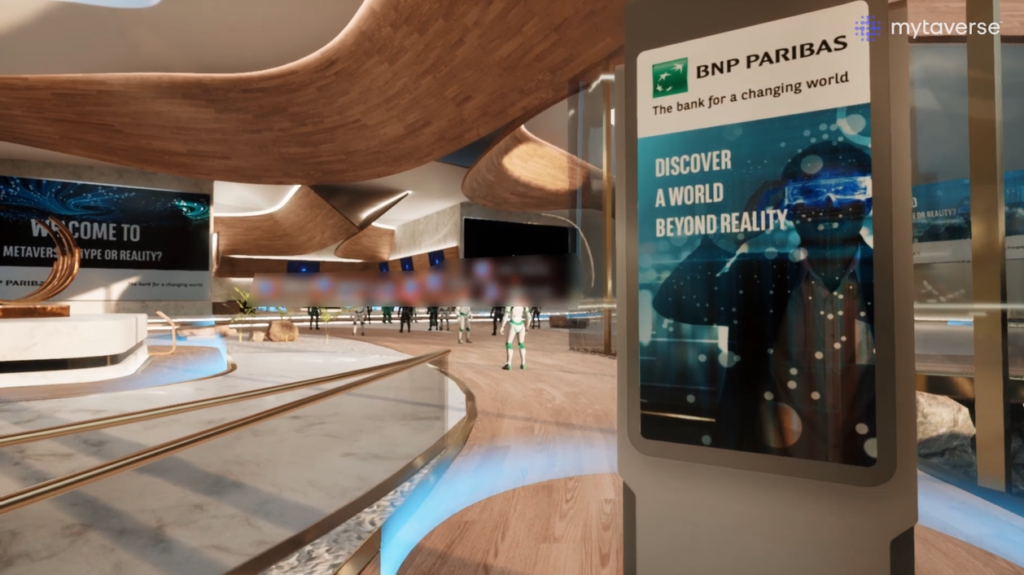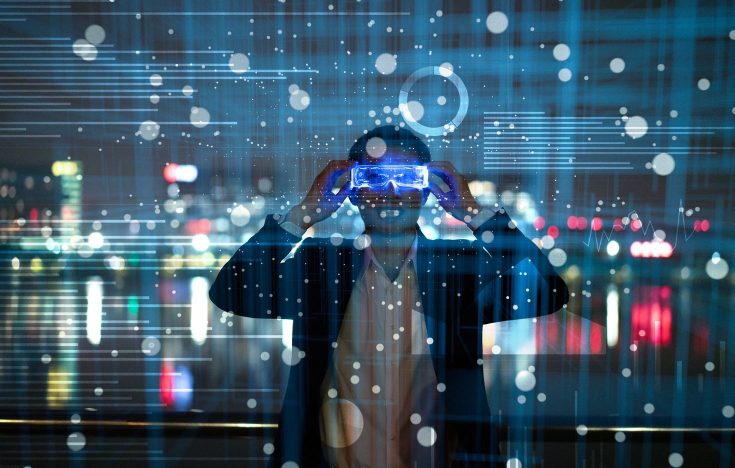In recent decades some technological advancements have altered society and business irrevocably, including the Internet, smartphones and the rise of artificial intelligence. Many believe the Metaverse will be the next major disrupter. Some estimates predict that the total addressable market for the Metaverse could be as big as USD13 trillion by 2030.[1]
To explore this exciting prospect, Securities Services at BNP Paribas hosted a ground-breaking event, simultaneously in person and in the Metaverse recently. With a panel of speakers convening in virtual reality, clients from Securities Services at BNP Paribas attended in-person in Hong Kong and Singapore, and were able to create avatars and interact seamlessly through the Mytaverse[2] platform during the event.
Hype or reality?
The vast potential of the Metaverse raises several major questions, concerns and challenges. Our panel discussion – Metaverse: Hype or Reality? – attempted to unpack this new world and help map its impact on the financial services sector.
As moderator Julien Kasparian, Head of Securities Services Hong Kong at BNP Paribas, noted: “We don’t have all the answers, but it is a glimpse into the future.”
So, what is the Metaverse? Put simply, it’s a different or alternate world instead of the real, physical world as we know it, said Johann Palychata, Head of Partnerships and New Platforms for Securities Services at BNP Paribas.
It’s not a new concept, with the term coined in the 1992 novel “Snow Crash”. And it still sounds a lot like a video game, Palychata said, or perhaps a more sophisticated social network. But it has the potential to go much further, with implications for financial services.
The Metaverse is not only about meetings, events, and interactions. It goes also far beyond, Palychata explained. Financial services will have a larger role to play when the Metaverse takes off, not least because digital asset ownership and transactions will be fundamental to its nascent economy. In a Metaverse future, financial service firms will need to develop specific offerings to serve the new actors of this space.
“The rise of new tools such as non-fungible tokens (NFTs), Web3, and blockchain are some options that form the backbone of digital ownership in the virtual world,” he said.
From Web1 to Web3 – and 4
Primavera De Filippi, Director of Research at the National Center of Scientific Research (CNRS), expanded on the fundamental concept of “Web3”.
Web1 was the World Wide Web, a read-only protocol where websites were owned by companies and users seldom produced content. Then with the emergence of social media came the era of user-generated content and increasing user-to-user interaction – this is Web2, where we’re at now.
The next iteration is Web3,[3] De Filippi explained, which encompasses owning and transacting in digital assets such as NFTs. Web4 is where the concept of spatiality comes in – with users occupying virtual space through avatars, where once they could be represented only by names or 2D photos. And the Metaverse is the potential culmination of all these technologies.
The need for interoperability
There is vast potential, and a great need to adapt, but the panellists agreed the technology still has a long way to go.
“We have many virtual worlds today, but those worlds are locked and not necessarily interconnected with each other. There is no interoperability,” De Filippi said. “So, the Metaverse we envision is not there yet, but we have the basic building blocks.”
Moreover, if the Metaverse is in fact an alternate reality, its complete value can be realised only when it is experienced in a truly immersive way, said Guo Cheng, President of STEPVR, a producer of virtual reality devices. STEPVR is preparing to launch an immersive product that promises to take users into the Metaverse seamlessly.
“The Metaverse is a new form of Internet, one that transmits the so-called five senses, including feeling, haptics, and smell,” said Dr Cheng. “Just like when the Internet began, every family needed a PC to access it, now every family needs to have a Metaverse portal.”
Is it really the next big thing? Time will tell, but it is an exciting responsibility to prepare ourselves.
“One thing is for sure – this is coming, and we will have to adopt it in one way or another,” said Luc Renard, Head of Securities Services for Southeast Asia and Head of Financial Intermediaries and Digital Transformation for Asia Pacific at BNP Paribas.
The world has not been standing still. Brace yourself, things are going to move at an even faster pace.

